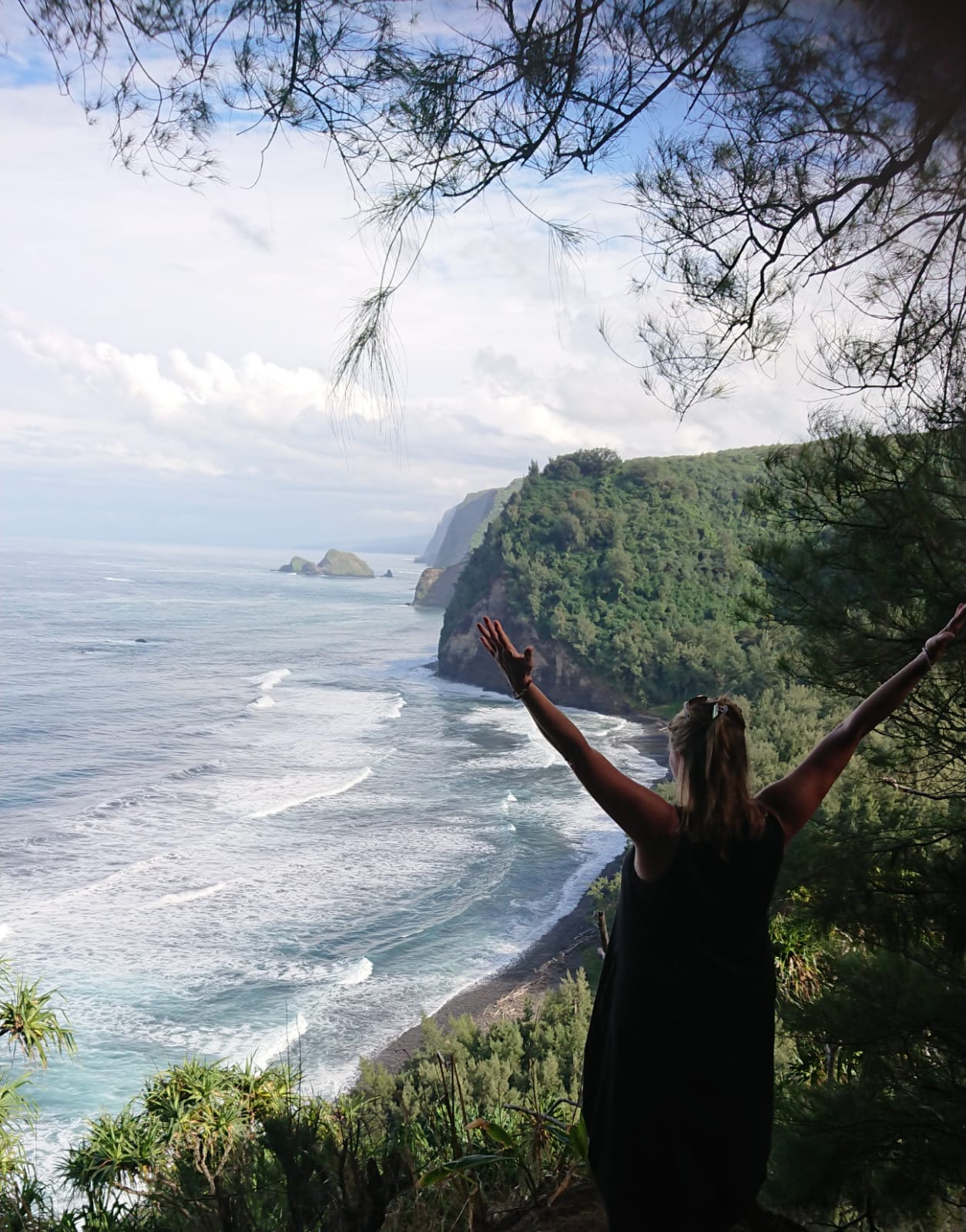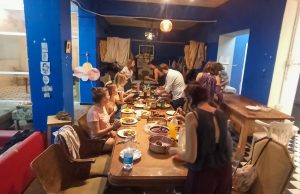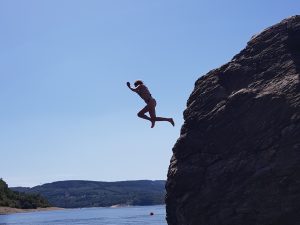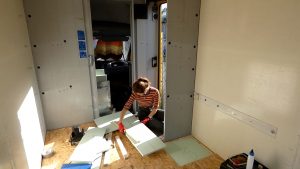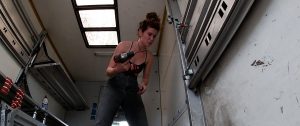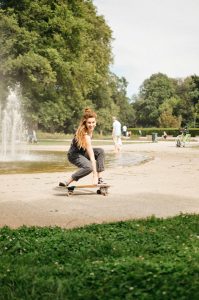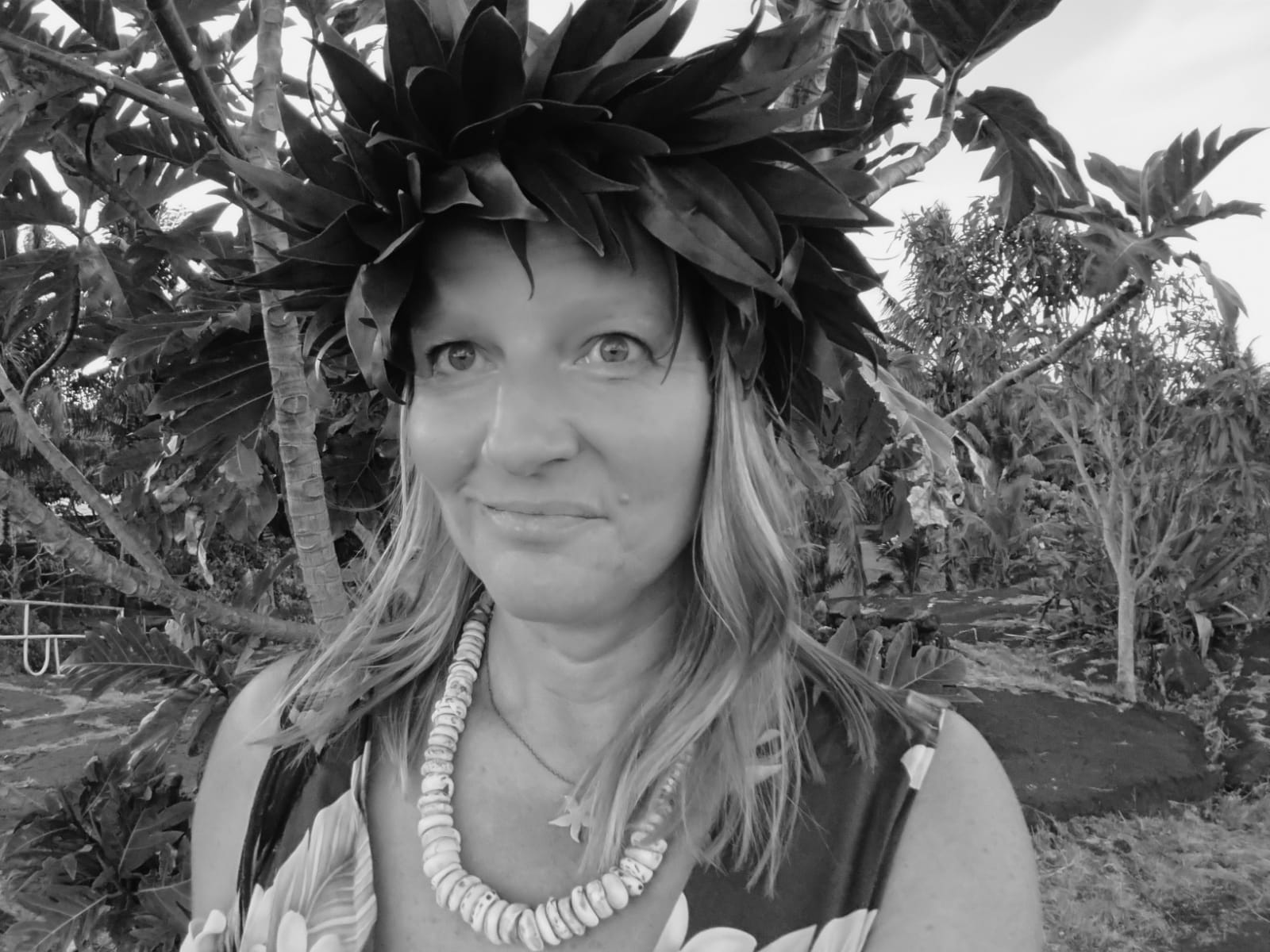
Facts
Base: Around Berlin
Occupation: Massage Teacher
Anja held the 5 day Lomi Lomi, the hawai’ian massage technique, workshop in Berlin, that I participated in. She has a vast knowledge of the hawai’ian culture, knows over 6 different massage techniques (Lomi, Thai and many more) and is a cool, inspiring person in general. We talk about spirituality, working outside of the norm, Hawai’i and living in community.
This interview took place in my flat in Berlin on the 31th October 2019 and was translated from German into English by me.
Interview
Hi Anja, thanks for taking the time!
How would you describe your job to somebody you’ve just met?
If somebody asks me what I do, I usually try not to shout it from the rooftops, that I give hawai’ian massage lessons. In the end, I do a variety of things, but Lomi Lomi classes are closest to my heart and continue to become my main work. But of course, I couldn’t playback the same texts every week, so currently I host 6 or 7 workshops a year.
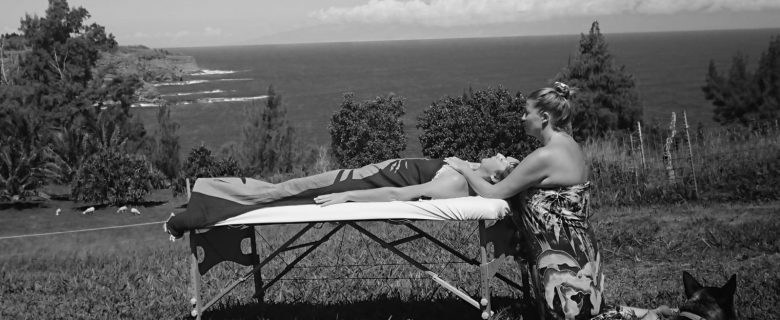
Life Path
Before we dive deeper into Lomi Lomi, I would like to know more about your occupation first. So could you describe a typical work week? Or have you gotten rid of that structure completely?
I have let go of that structure completely, but not without trying it out first. My 40 hour work week used to be a 60 hour one. I was in the fashion business and I always had jobs with a massive work load. It was normal to be in the office until 1 am, get fries at 1:30 am and be back in the office by 8 am. Of course this didn’t work out very well for long. […]This structure hasn’t been relevant for me since 2007 and I doubt that it ever will be, because there are other ways. I really admire people, who are able to work a 9-to-5, but I always have the urge to ask “how are you really doing?”.
So you were an employee in the fashion business?
First of all, I recently noticed, that I’ve never been an employee in my entire life. Starting during my A-Levels I was always self-employed and it just stayed that way. I had this aversion to sign a contract to become an employee.
What happend in 2007 to change your path?
2000 was the first big milestone, when I moved to Berlin and I continued to work in fashion and events. The next one was 2007, when my mother was diagnosed with cancer. The company’s I worked with were reluctant to give me the time off, that I needed. But how could I be chained to a desk, if they need me, at my mother’s? I had this crisis of meaning and I detached myself from the idea of needing to function at the desk.
In the end my mom beat the cancer. But during her sickness I got into healing, nutrition and positive thinking, not to heal her, but to contribute. This really boosted my spirituality and noticed that ‘something’ is there. I’ve always believed that and had in interest in magic or healing knowledge, from our [germanic] culture as well, especially as a teen. I forgot that knowledge in the business world.
This had a big impact on the question of meaning as well. “What can I share?” Or “Am I going to sit in an agency for 30 years? Is it important to people? To the planet?”
And was it during that time that you’ve started Lomi Lomi massages?
After moving to Berlin I met with a spiritual coach once a year. During my crisis of meaning she told me: “Come on, write it down: Lomi Lomi”. She told me to research it, but I was too curious and pestered her with questions. After she told me, that it is a massage technique from Hawai’i, I was thinking never am I going to massage, that’s not my thing. Until that moment, I had never received a massage. Well, I didn’t research it, but all of a sudden, Lomi Lomi was everywhere. I turned on the radio – Lomi Lomi, opened up a magazine – Lomi Lomi and I had never read about it before.

I stepped into the field, without intending it. It’s like when you buy a red golf and then you see them everywhere. It left me wondering, what’s behind all of this. I booked my first ever workshop and went all in with a 14 day workshop at a Yoga Ashram. I called the number of the teacher. I just wanted to speak to her, I didn’t have any particular questions. We shared a laugh and I started to gain confidence in my decision. I mean her name alone was a sign – Carolin Freudenberg [Freuden =joy].
In hindsight, I know that it was the right decision, but during the class I still thought that I don’t want to massage or get a massage, but my body and my heart had this urge to practice. It felt sort of like coming home.
Before we move on I have to ask: Who was that ‘coach’, how did you find her or how did she find you?
She is probably the only person I’ve never found any information on in the internet. She was recommended to me by a friend after I just came to Berlin. I think psychic fits her better, which is a really old term, even from our old [germanic] culture, than coach. Even after 16 year I still don’t know, how or what she sees. I just know, that the ideas or the companion she gave me were helpful.
Hawai'i
When did you feel the first urge to travel to Hawai’i, what was your goal and how was Lomi Lomi incorporated into all of it?
3 years into teaching Lomi Lomi I got the questions “So, have you been to Hawai’i?” almost every time. I wanted to teach in an authentic way and also I didn’t want to explain myself. And in 2012 the world was supposed to end anyways, I don’t know, if you remember but the Maya calendar and Nostradamus… so I knew the time had come. And the magic of Hawai’i pulled me in. I don’t think it will ever be like that again. I’ve now lived on Hawai’i for 30 weeks in 4 journeys.

On my first journey I planned 5 or 6 weeks and didn’t prepare much, because I knew from my previous travels to India, that I usually fall on my feet and meet the right people to be spontaneous with. I arrived in Hawai’i, without any safety nets whatsoever and worked at a festival, where I was overwhelmed. I missed most of the really good acts and even some of my shifts because I couldn’t stop looking at the waves and whale families.
During this first journey I met the people I needed, and that I still am connected to. I didn’t focus on Lomi Lomi I just took it all in and spend most of my time looking at the sea. And because the islands rise up so quickly, you can see the sea when you step out of a supermarket, when your invited to drink tea at someone’s house, pretty much from any where. I didn’t even need to go inside the sea, just looking at it was enough to find the connection and it felt like coming home, as I was raised at the Eastern Sea.
Have you ever tried surfing?
No, but I’ve tried swimming a couple of times. I’m not the best swimmer and I’ve learned to respect the sea as a child. On most beaches in Hawai’i you can’t swim, because of steep cliffs, waves or strong currents.
There was a time where I tried to conquer my trauma of almost drowning, with facing my fear head on in Hawai’i. But yet again, it felt like the universe pulled the brakes on that mission. For example, when I visited people’s homes and asked who the person displayed on the picture was, they usually replied something along the lines: “Oh yes, that was an uncle, great swimmer, but he drowned.”
So that’s why I haven’t tried surfing myself, but I’ve accompanied many surf trips to buy ice cream and beer, and I love watching surfers. Especially watching woman outside the typical age for surfing is great. It shows me, that them and me aren’t from the same tribe, I like to connect with the sea, while still standing on land.
I love to see women in general paddle out cause it usually changes the mood of the line up for the better. Just our of curiosity, what is a ‘typical’ hawai’ian house like?
There are very few true ‘Hawai’ians’ as far as the blood line goes. Most people, I’ve met so far were american and fulfilled their dreams. It used to be inexpensive to buy an acre [~4000 m²]. Usually it’s a simple and wooden cabin, as you don’t need any heating and there is always the possibility of lava or a hurricane. The cabin is surrounded by a beautiful garden, as everything grows really quickly. From first hand experience I can tell, that gardening is real work there, I’m talking massive stones. Because of the high humidity, the cabins usually don’t have any windows, but fly screens. Obliviously millionaires build differently, but that’s not where I’m typically invited.
On my last trip I visited a friend, that was house sitting for a yacht captain/sailor, that does round trips to Tahiti and back. He build the house with local hawai’ian builders, that have the knowledge and carry the spirits. It was an interesting building, that had blinds in the walls, that looked like gills, for a better air flows in the house.
Just another interesting fact about Hawai’i that it is prohibited by law to have a private beach, so beach front house owner have to ensure, that the beach is still accessible. Some people with a lot money are starting to break that law, but it shows the original hawai’ian mind set, that everything should be for everybody.
It is important to question the ownership of land. How you build is one thing, but believing the land belongs to you – that’s not really possible. You own the house, but you don’t own the land.
Anja on ownership in Hawai’i
Aina means the entire planet and could be translated with ‘the land’. In our culture, you have a small garden, that you try to make pretty and it is ‘yours’. This attitude that below the surface there is an entire planet, that needs the same care as your small garden, is anchored in the hawai’ian culture with Aina. As surfer for example, you know that you own your body and your board, but you don’t own the ocean. With water we know this, why is it so hard to treat the land the same?
Community
During the workshop you told me that you live on the country side, in a project that has it’s own produce shop. Could you tell me a little more on, what this project is?
Well, at the moment I’m actually in the process of leaving this community that has been my home in Germany during the warm parts of summer. They heat with wood, so in winter I like to be either in Berlin or travelling.
Trough travelling, and the developments in Berlin, I had this urge in 2008 to leave the comercial side of things and instead find people that live self sustainable, that think new, both in a political and an ecological term. That are ready to share what they own and with that share what they are as well. There are communes that share everything, from cars, belongings to partners. But I was still in the process of figuring out, how much community do I want, how far can a community go? Ho much solitude is necessary to give that much?

And during these times, it was the right choice to stay in the communtiy , because I was able to droped out of that “consumer mindset”. In Berlin, as beautiful as it is, I feel like I’m constantly touching my wallet. But there I pay my share with around 5 € a day. Which is not only an affordable solution, but also and more importantly through that I don’t have to think about money for weeks. I don’t move my car, I don’t go shopping, because we eat the vegetables from the garden or order in large quantities. The little store we have is a food co-operation, which means, that it is build on trust, that everybody signs in their ‘shopping-book’ what they use and it’s not profit-orientated. There is no cashier or controls. Even before the whole zero waste movement started it was normal for us to fill up a barrel of lentils, that you’ll have for the next 3 years. Here in Berlin everybody runs around with their shopping between 6 and 7pm. Which is fine, but through ordering bigger, you can support the companies you want to, produce less waste and save money. The knowledge, that this is possible and that I’m not dependend on the consumption driven society, in the way it’s used in cities, creates such a feeling of freedom in me.
Could you tell me a bit more about this group of friends and families? And how it at started?
It’s based on friendships. I started meeting indivuals that were thinking differently, were very real, open- hearted, demasked and connected to the earth. Coming from the Berlin Party Scene, I was intrigued to see. where and how they lived, because I formed deep bonds very quickly. It felt kind of like meeting your tribe.
When I went there for the first time it felt like coming home. The entertainment was more singing at the fire, than going clubbing, but I liked to have the option of both. It was nice to see, that something different can appear here and that I don’t need to travel across the world to find it.
These friendships grew over the time so now, they are my family. And even if I move away, they will continue to be my family, which has positive and negative sides. I won’t speak to the flip side of the coin new, however. I could write a book about everything.
Could you tell me a little more about the housing is it a village?
It is multiple houses in a village, very close to the former german-german border. After the wall fell, the houses there were very affordable. So a group formed and was able to buy the first house with the profits of just one fusion festival, where they sold cake and jamaican stlye pineapple beer. And because so many houses were empty in that village, the people kept coming, and a point it was 50 / 50 ‘freaks’ and people that had stayed there, which formed a beautiful exchange. For example, now there are more firefighters with dreadlocks, than without.
What would you do, if you knew you couldn’t fail?
In that case, I would really get together courage and focus to find a house at the Eastern Sea, which hosts people, that want to take classes. Because I want the [Hawai’ian] knowledge to find a place in this country as well. Also not to constantly travel with my massage benches or carry them up flights of stairs would be nice. To have a place to experience Lomi Lomi and go to take the breaks at the sea. That one house in Hawai’i showed me what it feels like to arrive in the perfect place.
Thank you, Anja
Since the interview took place, this vision has manifested it self 10 min from the eastern sea.
If this interview sparked an interest for the Hawai’ian culture here is a reading recommendation: Aloha, die Lust am Leben, Paul Pearsall
If you are from Germany definetly check out: https://www.alohaaina.de/
